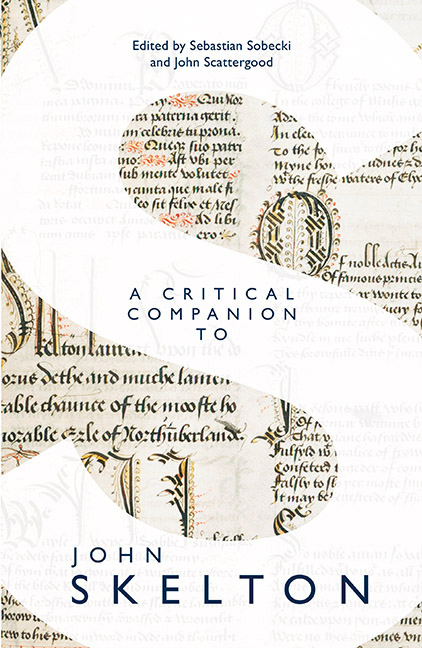Book contents
- Frontmatter
- Dedication
- Contents
- Acknowledgements
- Contributors
- Abbreviations
- Conventions
- Introduction
- 1 John Skelton (?1460–1529): A Life in Writing
- 2 Religion
- 3 Law and Politics
- 4 Classical Literature
- 5 Humanism
- 6 Satires and Invectives
- 7 Lyrics and Short Poems
- 8 Skelton's Voice and Performance
- 9 Literary Tradition
- 10 Skelton and the English Language
- 11 Skelton's English Works in Manuscripts and Print
- 12 Skelton's English Canon
- 13 Reception and Afterlife
- A Skelton Bibliography
- Index of Manuscripts
- Index of Printers and Stationers
- General Index
2 - Religion
Published online by Cambridge University Press: 24 July 2019
- Frontmatter
- Dedication
- Contents
- Acknowledgements
- Contributors
- Abbreviations
- Conventions
- Introduction
- 1 John Skelton (?1460–1529): A Life in Writing
- 2 Religion
- 3 Law and Politics
- 4 Classical Literature
- 5 Humanism
- 6 Satires and Invectives
- 7 Lyrics and Short Poems
- 8 Skelton's Voice and Performance
- 9 Literary Tradition
- 10 Skelton and the English Language
- 11 Skelton's English Works in Manuscripts and Print
- 12 Skelton's English Canon
- 13 Reception and Afterlife
- A Skelton Bibliography
- Index of Manuscripts
- Index of Printers and Stationers
- General Index
Summary
John Colet's convocation sermon of February 1512 was an impassioned demand for the reform of the clergy and an attack on their covetousness and secularity. It was not, however, anti-clerical. The sermon of February 1512 was in practice profoundly clericalist. Colet, an eminent humanist scholar, argued that ‘the dignity of priests … is greater than either the king's or emperor's; it is equal with the dignity of angels’ (Harper-Bill 1997: 18). Colet's view of the priesthood reflected above all an emphasis on their status as different and separate, as a superior estate. And indeed the central ritual of the medieval Church, the mass, did stress the privileged elevated nature of the clergy. As Eamon Duffy writes:
the prestige of the Sacrament [of the Altar] as the centre and source of the whole symbolic system of late medieval Catholicism implied an enormously high doctrine of priesthood. The priest had access to mysteries forbidden to others; only he might utter the words which transformed bread and wine into the flesh and blood of God incarnate.
(Duffy 1992: 110)The mass was at the centre of medieval Catholicism. It was its central miracle, its image of a reconciled Christendom and a source of constant mediation and prayer. Those entrusted with performing the Eucharistic rite were a class apart. And John Skelton was one of these men.
It should be relatively easy to write about Skelton's religion. He entered holy orders in 1498 and was rector in the parish of Diss, Norfolk, for most of his life. There are numerous moments in his life when he performed regular clerical duties, including celebrating mass on 1 November 1498 in the presence of Henry VII. The problem is that ‘religion’ as it appears in such works as Piers Plowman, the York Corpus Christi play, or in devotional fifteenth-century verse is simply absent from Skelton's poetry. There is none of the searching vernacular theology that is a marked feature of late fourteenth- and fifteenth-century writing. Skelton's religion is ‘medieval’ in a way that has become unfashionable among scholars who have rightly stressed the vibrancy and popularity of fifteenth-century Western Christianity.
- Type
- Chapter
- Information
- A Critical Companion to John Skelton , pp. 26 - 36Publisher: Boydell & BrewerPrint publication year: 2018



